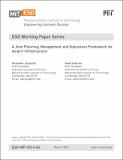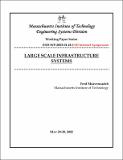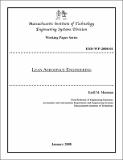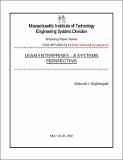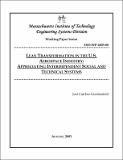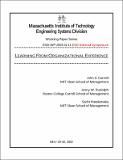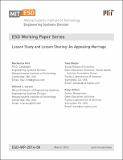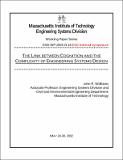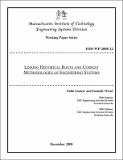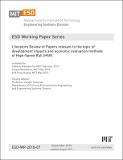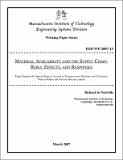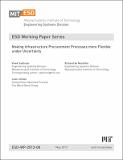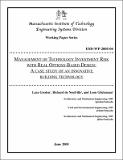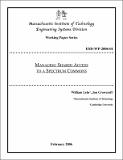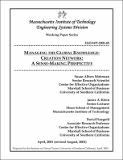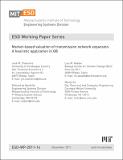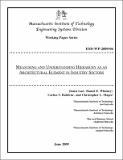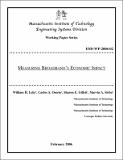Browsing Engineering Systems Division by Title
Now showing items 146-165 of 273
-
A Joint Planning, Management and Operations Framework for Airport Infrastructure
(Massachusetts Institute of Technology. Engineering Systems Division, 2014-03)Many airports around the world are actively considering development or expansion projects. Such projects can spur tremendous benefits but are investment-intensive and span several decades from conception to completion. We ... -
Knowledge Diversity in the Emerging Global Bio-Nano Sector
(Massachusetts Institute of Technology. Engineering Systems Division, 2012-04)As scientists are able to understand and manipulate ever smaller scales of matter, research in the fields of biotechnology and nanotechnology has converged to enable such radical innovations as lab-on-a-chip devices, ... -
Large Scale Infrastructure Systems
(Massachusetts Institute of Technology. Engineering Systems Division, 2002-05)Highways, bridges, office buildings, houses, etc. are typical large-scale infrastructure systems of physical facilities that must be planned, designed, built, operated, and maintained. In addition to physical requirements, ... -
Lean Aerospace Engineering
(Massachusetts Institute of Technology. Engineering Systems Division, 2008-01)A framework for Lean Engineering is presented, based upon observational findings from a decade of research in the aerospace domain, published works on Toyota and Southwest Airlines, and practitioner input. The framework ... -
Lean Enterprises – A Systems Perspective
(Massachusetts Institute of Technology. Engineering Systems Division, 2002-05)Becoming a “Lean Enterprise” is increasingly being recognized as an important strategy in achieving critical strategic goals such as responsiveness, cycle time and cost across all phases of the product life cycle. The ... -
Lean Transformation in the U.S. Aerospace Industry: Appreciating Interdependent Social and Technical Systems
(Massachusetts Institute of Technology. Engineering Systems Division, 2003-08)Lean practices and principles build on a half-century of successive initiatives aimed at transforming social and technical systems in organizations. While they are seen as central to the revitalization of the U.S. aerospace ... -
Learning from Organizational Experience
(Massachusetts Institute of Technology. Engineering Systems Division, 2002-05)Learning-in-action, the cyclical interplay of thinking and doing, is increasingly important for organizations as environments and required capabilities become more complex and interdependent. Organizational learning involves ... -
Lesson Study and Lesson Sharing: An Appealing Marriage
(Massachusetts Institute of Technology. Engineering Systems Division, 2014-03)Lesson Study and lesson sharing are two educational initiatives that, if merged, have the potential to revolutionize how teachers plan and deliver lessons. Lesson Study is the joint production of lessons by a small team ... -
The Link between Cognition and the Complexity of Engineering Systems Design
(Massachusetts Institute of Technology. Engineering Systems Division, 2002-05)This paper focuses on the role of human cognition in the design of large complex systems. It contrasts the physical system that is the product of the design with the cognitive model that is used by the designer to “understand” ... -
Linking Historical Roots and Current Methodologies of Engineering Systems
(Massachusetts Institute of Technology. Engineering Systems Division, 2008-12)This paper reviews the historical context and present impact of two sets of literature: the work of Joseph Schumpeter and the field of Strategy Development. Schumpeter’s theories about the impact of technology or innovation ... -
Literature Review of Papers relevant to the topic of development impacts and economic evaluation methods of High-Speed Rail (HSR)
(Massachusetts Institute of Technology. Engineering Systems Division, 2011-08)With HSR continuing to the target of investments around the world, with even the United States elevating the place of HSR on the public agenda, we thought this compendium of summaries of references on HSR and related topics ... -
Low-Cost Airports for Low-Cost Airlines: Flexible Design to Manage the Risks
(Massachusetts Institute of Technology. Engineering Systems Division, 2007-03)The paradigm of airport planning and design is changing fundamentally. Low-cost airlines have become significant drivers of airport planning, along with aircraft size and other technical factors. They have different ... -
Making Infrastructure Procurement Processes more Flexible under Uncertainty
(Massachusetts Institute of Technology. Engineering Systems Division, 2013-05)A third to a half of development projects undergo restructuring due to changes in project objectives, scope or other unanticipated changes, therefore requiring schedule extensions, budget additions and rework. Current ... -
Management of Technology Investment Risk with Real Options-Based Design: A case study of an innovative building technology
(Massachusetts Institute of Technology. Engineering Systems Division, 2005-06)Implementation of innovative technologies is hindered by the perceived risks of technical failure or increased first cost. However, by designing a system to include real options within its architecture and by recognizing ... -
Managing Complexity with the Department of Defense Architecture Framework: Development of a Dynamic System Architecture Model
(Massachusetts Institute of Technology. Engineering Systems Division, 2007-02)Architecture frameworks are tools for managing system complexity by structuring data in a common language and format. By characterizing the form, function, and rules governing systems, architecture frameworks serve as a ... -
Managing Shared Access to a Spectrum Commons
(Massachusetts Institute of Technology. Engineering Systems Division, 2006-02)The open access, unlicensed or spectrum commons approach to managing shared access to RF spectrum offers many attractive benefits, especially when implemented in conjunction with and as a complement to a regime of marketbased, ... -
Managing the Global knowledge-creation Network: A Sense Making Perspective
(Massachusetts Institute of Technology. Engineering Systems Division, 2001-08)We have entered the era of the knowledge economy, a period when knowledge has replaced natural resources and capital as the most important economic resource. Increasingly, corporations are reaching out globally to secure ... -
Market-based valuation of transmission network expansion. A heuristic application in GB
(Massachusetts Institute of Technology. Engineering Systems Division, 2011-12)Transmission investments are currently needed to meet an increasing electricity demand, to address security of supply concerns, and to reach carbon emissions targets. A key issue when assessing the benefits from an expanded ... -
Measuring and Understanding Hierarchy asMeasuring and Understanding Hierarchy as an Architectural Element in Industry Sectors an Architectural Element in Industry Sectors
(Massachusetts Institute of Technology. Engineering Systems Division, 2009-06)Hierarchy is a generic structure in which levels are asymmetrically ordered. In an industry setting, classic supply chains display strict hierarchy, whereas clusters of firms have linkages going in many different directions. ... -
Measuring Broadband’s Economic Impact
(Massachusetts Institute of Technology. Engineering Systems Division, 2006-02)Does broadband matter to the economy? Numerous studies have focused on whether there is a digital divide, on regulatory impacts and investment incentives, and on the factors influencing where broadband is available. However, ...

